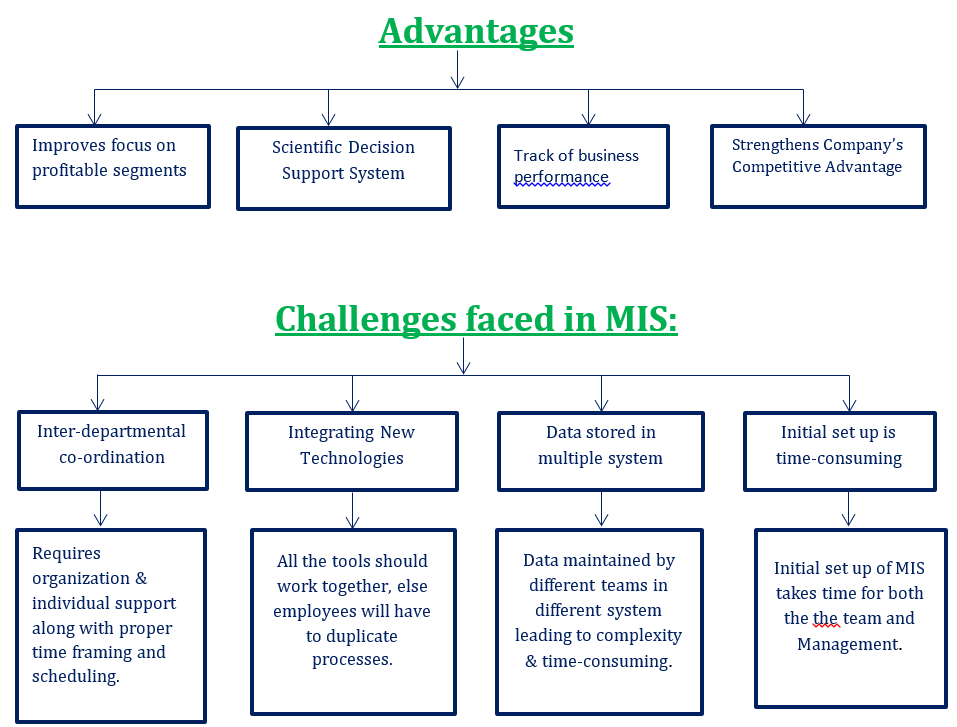Management Information System
Introduction:
“Information by itself is meaningless until it’s interpreted and analyzed to capture insight and harness innovation.” Management Information System popularly known as MIS is a systematic organization and presentation of information that is generally required by the “Decision maker” of an organization. Accurate decision making relies on accurate data, information and an awareness of all options available which Management Information System (MIS) helps to provide. Successful businesses are built and grown through a series of well-informed and sound decisions. It also helps new age businesses to evaluate critical decision making points like deployment of scarce capital.
The role of MIS in decision making is to generate data that is useful to Decision maker as they consider strategy, staffing, teams, marketing and more. Choosing what data MIS tracks as well as how to use data to arrive at decisions can make or break the direction of a business in the competitive marketplace.
At their core, Management Information System exist to store data and create reports that guide businesses to take a scientific approach towards decision making rather than rely on gut of the Decision maker.

For Ad-hoc & Real time MIS, support of software or ERP systems would be critical. Excel based MIS systems can be developed for Scheduled MIS reports. Frequency of MIS report can be determined based on Business nature & requirement.
Decision making through use of MIS:
When Decision maker get an accurate MIS report, they do not have to guess about who is doing well or what needs to be improved or wonder where their blind spots are. The data helps them see a clearer, less-biased picture than they could come up with on their own. Since MIS provides a plethora of information that helps with proactive decision making, it is also useful for goal setting and review. It is easy to track actual performance against your goals and then either increase or decrease your goals in the future to make them more probable and make profit margins more accurate. Let us understand how MIS can influence decision making with help of few case studies.
Case Study-I:
Scenario without MIS:
Game Product Inc. is one of the leading manufacturers of Games and has major 3 segments- Sporting Games Division, Board Games Division & Computer Games Division. The Income Statement of Game Product Inc. as on 31st August, 2020 highlights the following information:
Game Products Ltd
Income Statement for the period ending 31st August, 2020
Particulars
Sporting Goods Division
Board Games Division
Computer Games Division
Sales Revenue
20,000
34,000
29,000
Cost of Goods Sold [B]
6,000
11,000
10,000
Gross Margin [A-B]
14,000
23,000
19,000
Allocated Overheads
1,205
2,048
1,747
Selling and Administrative Expense
9,500
16,000
15,000
Operating Income
3,295
4,952
2,253
As evident from the breakup above & based on only above information, Decision maker of Game Products Ltd is of the opinion that Board Games Division is the most profitable segment.
Scenario with MIS:
Game Products Ltd
Segment wise Profitability for the period ended 31st August, 2020
Particulars
Sporting Goods Division
Board Games Division
Computer Games Division
Sales [A]
20,000
34,000
29,000
Cost of Goods Sold [B]
6,000
11,000
10,000
Gross Margin [A-B]
14,000
23,000
19,000
Allocated Overheads
1,205
2,048
1,747
Selling and Administrative Expense
9,500
16,000
15,000
Operating Income
3,295
4,952
2,253
Income Tax Expense (30%)
988.5
1485.6
675.9
Net Income [C]
2,307
3,466
1,577
Profit Margin Ratio to Sales [C/A]
11.53%
10.20%
5.44%
Amount Invested [D]
6,500
25,000
8,000
Return on Amount Invested [C/D]
35.48%
13.87%
19.71%
With the help of more data, even though the Board Games Division was contributing the maximum sales to the company, it is still the least profitable segment in terms of Return on Amount invested. Also, it came to light that Sporting Goods Division earns a higher margin on sales along with highest return of 35.48% on amount invested and is actually the most profitable segment of the company.
Therefore, if we analyse data properly with the help of MIS, the decision making changes. Due to the Decision Support Systems, Game Products Ltd can be enabled to make more of the informed decisions within the organizations which otherwise would be impossible without MIS.
Case Study-II:
Scenario without MIS:
Luctose Limited is a FMCG company, which deals into Noodles, Biscuits, Snacks & Chocolates. The Profit & Loss account for the year ending 31st March, 2020 is:
Particulars
Amount
Sales Revenue
30,61,000
Cost of Production
13,81,300
Direct Exp
5,37,800
Gross Profit
11,41,900
Add :Indirect Income
1,72,000
Less :Indirect Exp
Employee Benefit Exp
2,87,500
Selling & Distribution Exp
31,400
Office & Administration Exp
91,100
Total Indirect Exp
4,10,000
Profit Before Interest & Tax
9,03,900
Less :Interest Exp
54,000
Profit After Interest & Tax
8,49,900
Less :Tax Exp
2,81,460
Profit After Tax
5,68,440
As seen from above, the overall company's profit is Rs.5,68,440/-. The Board of directors are not satisfied with the company's performance. So Board of Directors has appointed a management consultant & seeks to check the overall performance of the company.
The Management Consultant prepared MIS on the basis of Product-wise Profitability. The Management consultant submitted the MIS along with his report to the Board of Directors. The MIS prepared by Management Consultant is as under-
Particulars
Noodles
Biscuits
Snacks
Chocolates
Total
Units Sold
70
450
200
340
1,060
Sales Price
3,900
2,000
4,000
3,200
Sales Revenue
2,73,000
9,00,000
8,00,000
10,88,000
30,61,000
Cost of Production
1,91,100
3,15,000
4,40,000
4,35,200
13,81,300
Direct Exp
1,02,000
63,000
2,64,000
1,08,800
5,37,800
Gross Profit
(20,100)
5,22,000
96,000
5,44,000
11,41,900
Add :Indirect Income
55,000
42,000
30,000
45,000
1,72,000
Less :Indirect Exp
Employee Benefit Exp
89,000
58,000
76,500
64,000
2,87,500
Selling & Distribution Exp
12,500
3,400
5,500
10,000
31,400
Office & Administration Exp
15,000
20,000
32,100
24,000
91,100
Total Indirect Exp
1,16,500
81,400
1,14,100
98,000
4,10,000
Profit Before Interest & Tax
(81,600)
4,82,600
11,900
4,91,000
9,03,900
Less :Interest Exp
6,700
18,500
8,800
20,000
54,000
Profit After Interest & Tax
(88,300)
4,64,100
3,100
4,71,000
8,49,900
Less :Tax Exp
-
1,39,230
930
1,41,300
2,81,460
Profit After Tax
(88,300)
3,24,870
2,170
3,29,700
5,68,440
The MIS revealed the fact that manufacturing of Noodles is not profitable to the company & Snacks segment is hardly earning anything for the company. In fact, this loss is set off against the profits earned from other segments. Major reason for this is higher production cost for Noodles & higher indirect cost overheads for Snacks. Accordingly, company should do away with Noodles manufacturing unless they can find a market with premium pricing for their product. Also, if company wishes to continue with Snacks, they should dig in their cost structure & optimize their Indirect cost overheads to make Snacks segment more profitable.
As seen from the case studies above, MIS reports are arranged so the management can easily evaluate various aspects of a company's performance. It's like looking at the instruments and gauges on the dashboard of a car, but these MIS gauges are lined up on the front of the desk.
As it can be seen from above two case studies, MIS can offer following advantages:

Conclusion:
Every organization consists of one or more than one core competency, that is, to have a competitive edge over their competitors. With the application of a proficient Management Information System, company has better chances to be ahead of their competitors.
MIS is a subset of the overall planning and control activity covering the application of human, technologies and producers of the organization. As organization grows, MIS allows information to move between functional area and department instantly, reducing need for face to face communication among employee, thus increasing the responsiveness of the organization. Therefore, MIS are indispensable to the businesses & industries to meet the future challenges as a Management Information System is essential for any small business owner who is serious about improving the performance of his company. Without a good MIS, managers are managing by trial-and-error rather than making intelligent decisions based on a thoughtful analysis of data.
Authors:
CA Aakash Mehta, Partner, MASD
E-mail: aakash.mehta@masd.co.in
Zaran Saiya, Consultant, MASD
E-mail: zaran.saiya@masd.co.in
Varsha Dhake, Consultant, MASD
E-mail: varsha.dhake@masd.co.in
Poojan Joshi, Associate Consultant, MASD
E-mail: poojan.joshi@masd.co.in


.svg)

